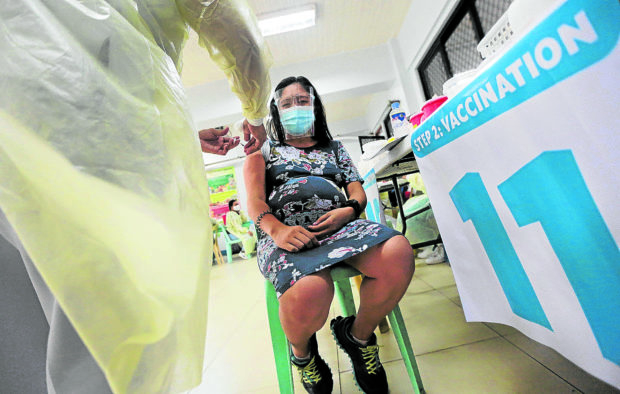Vaccine ‘no-shows’ alarm health experts

EXPRESS LANE: Julie Ann Lansang, who is 33 weeks pregnant, receives the China-made Sinovac vaccine during a two-day inoculation drive organized by the Office of the Vice President and the Pasig City government at Manggahan High School in Pasig City last week. (Photo by GRIG C. MONTEGRANDE / Philippine Daily Inquirer)
MANILA, Philippines — The increasing number of vaccine “no-shows,” or people skipping their jab schedules, has alarmed health-care professionals, who lambasted so-called antivaxxers for spreading false information on the need to be inoculated.
The Vaccine Solidarity Movement said vaccine hesitancy was being influenced on multiple fronts, citing politics, false experts and unverified news reports for the low COVID-19 vaccine usage. The group includes the Philippine Medical Association (PMA), the Philippine Foundation for Vaccination (PFV), the University of the Philippines College of Public Health, the Philippine Nurses Association, the Philippine Pharmacists Association, the Philippine Dental Association, and the Alliance of Allied Health Organizations.
“The biggest concern (in the COVID-19 pandemic) is that the intervention to actually help stop the spread is before us and yet it is being undermined to the detriment of our country,” said PFV communications adviser Amor Maclang.
Unverified information
Vaccine advocate Dr. Minguita Padilla last week sounded the alarm after 48 percent of persons due to get their shot in Cebu City and 22 percent in a vaccination site in Quezon City did not show up on the same vaccination day, shortly after a radio interview of a retired professor, who questioned vaccine safety and efficacy, went viral.
“Having worked in the front lines and in some vaccination sites, we’ve been observing recently ‘no-shows’ in different places in Batangas, Cebu and in Metro Manila. We felt that this might have been the effect of listening to social media and some of the news items that were not verified. People were scared (of the vaccines),” said former health undersecretary and panel speaker Dr. Kenneth Hartigan-Go.
But Hartigan-Go clarified that antivaxxers were different from vaccine-hesitant people as the latter could be having only doubts or were mere fence-sitters waiting for a better vaccine brand to become available.
“But there is no such thing as a better vaccine. We believe in the constant messaging that the best vaccine is the vaccine that is readily available to you now because we know that having vaccination early is going to confer earlier protection and that will bring (us) to herd immunity and decrease the chance of (the virus’) mutation,” he added.
‘Like terrorists’
PMA president Dr. Benito Atienza appealed to the media to seek information on COVID-19 and the vaccines not just from any medical doctor, but from infectious diseases and vaccine specialists.
Without naming individual doctors, Atienza said the PMA had constantly warned members for putting out unverified opinion as a violation of the PMA’s Code of Ethics.
Incidentally on Monday, a pamphlet from a group called Gising Maharlika was being distributed to residents in Liliw, Laguna.
A copy of the material shared by a resident to the Inquirer claimed that masks and swab tests did not work and that no person could ever die of COVID-19.
Dr. Lulu Bravo, PFV convener and National Adverse Events Following Immunization Committee chair, said the Philippines used to have a 101-percent vaccine uptake before the scare caused by the dengue vaccine Dengvaxia a few years back.
She also reiterated that all COVID-19 vaccines approved by the Food and Drug Administration (FDA) were safe and effective.
“These antivaxxers are like ‘terrorists.’ Would you give them a platform? If you had the opportunity to save your country, would you give the terrorists their time in court?” Bravo said.
Expanded coverage
In a bid to speed up the inoculation drive, local governments in Metro Manila that have fully vaccinated their eligible constituents have also started inoculating residents from neighboring cities and towns as well as from the provinces of Rizal, Laguna, Bulacan and Cavite, the Metropolitan Manila Development Authority (MMDA) announced on Monday.
MMDA Chair Benhur Abalos said that the cities of San Juan and Mandaluyong and the municipality of Pateros have vaccinated at least 70 percent of their total population.
While these areas have the smallest populations in Metro Manila, “they are more than willing to help those in [Metro Manila] and those from other areas outside NCR (National Capital Region). Anyone, not necessarily residents of these local government units, can have their schedule and be vaccinated in these areas,” Abalos said.
He said Mandaluyong had started vaccinating nonresidents, with 50 percent of recipients on Friday and 30 percent on Saturday not living in the city.
Enough supply
At the same time, Secretary Carlito Galvez Jr., who handles the mass immunization drive, said there was no more need for local governments to buy COVID-19 vaccines as the national government has secured enough doses to cover the country’s population.
He said they might even be questioned by the Commission on Audit if they continued to buy vaccines.
Galvez said in a Malacañang press briefing on Monday that the country had secured 165.4 million doses from procurements and donations, and the number could increase to 190 million with additional donations and if the national government would decide to get more.
Some 120 million doses were expected to be delivered in the next four to five months, he said.
An official of the Department of Health (DOH) has also dismissed claims of a trend reversal wherein more children were getting infected compared to adults and the elderly.
“We have not actually seen that in our data,” said Alethea de Guzman, director of the DOH Epidemiology Bureau.